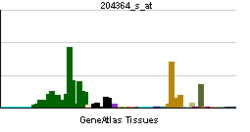REEP1
Receptor expression-enhancing protein 1 is a protein that in humans is encoded by the REEP1 gene.[3][4][5]
References
Further reading
- Strausberg RL, Feingold EA, Grouse LH, et al. (2003). "Generation and initial analysis of more than 15,000 full-length human and mouse cDNA sequences.". Proc. Natl. Acad. Sci. U.S.A. 99 (26): 16899–903. doi:10.1073/pnas.242603899. PMC 139241
 . PMID 12477932.
. PMID 12477932.
- Ota T, Suzuki Y, Nishikawa T, et al. (2004). "Complete sequencing and characterization of 21,243 full-length human cDNAs.". Nat. Genet. 36 (1): 40–5. doi:10.1038/ng1285. PMID 14702039.
- Ballif BA, Villén J, Beausoleil SA, et al. (2005). "Phosphoproteomic analysis of the developing mouse brain.". Mol. Cell Proteomics. 3 (11): 1093–101. doi:10.1074/mcp.M400085-MCP200. PMID 15345747.
- Gerhard DS, Wagner L, Feingold EA, et al. (2004). "The status, quality, and expansion of the NIH full-length cDNA project: the Mammalian Gene Collection (MGC).". Genome Res. 14 (10B): 2121–7. doi:10.1101/gr.2596504. PMC 528928
 . PMID 15489334.
. PMID 15489334.
- Hillier LW, Graves TA, Fulton RS, et al. (2005). "Generation and annotation of the DNA sequences of human chromosomes 2 and 4.". Nature. 434 (7034): 724–31. doi:10.1038/nature03466. PMID 15815621.
- Behrens M, Bartelt J, Reichling C, et al. (2006). "Members of RTP and REEP gene families influence functional bitter taste receptor expression.". J. Biol. Chem. 281 (29): 20650–9. doi:10.1074/jbc.M513637200. PMID 16720576.
- Züchner S, Wang G, Tran-Viet KN, et al. (2006). "Mutations in the novel mitochondrial protein REEP1 cause hereditary spastic paraplegia type 31.". Am. J. Hum. Genet. 79 (2): 365–9. doi:10.1086/505361. PMC 1559498
 . PMID 16826527.
. PMID 16826527.


 . PMID 12477932.
. PMID 12477932. . PMID 15489334.
. PMID 15489334. . PMID 16826527.
. PMID 16826527.